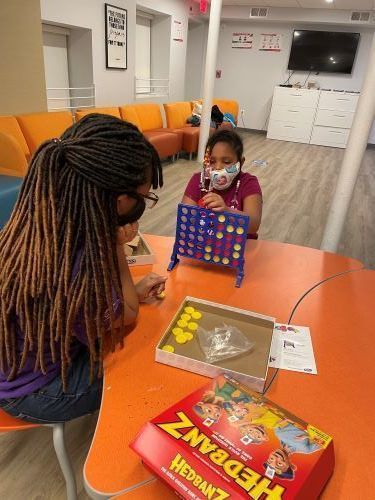
We appreciate Julie Zauzmer and the Washington Post for the recent article, “The pandemic helped D.C. slash family homelessness. But a new crisis looms.”
I spent a good amount of time chatting with Julie about the plight of families in shelter and the services we provide, much of which didn’t make the cut for the article, and I want to ensure that Playtime’s position is not misconstrued.
Playtime applauds the advances Mayor Bowser has made in closing D.C. General and the overflow shelter motels along New York Avenue. And we fully support the more dignified and comfortable short-term family housing (STFH) shelters located in each Ward.
Ensuring families move into their own homes as quickly as possible is a priority for the city, as it should be. However, child development and basic needs should not be put on hold in service of housing goals. Children of all ages need to play every day, and both guided and free play can uniquely help children heal from the stress of homelessness. Play is the brain's favorite way to learn. We have made it our mission to advocate for play for children in every housing setting, with a focus on shelters that have historically restricted access to play, just when children need it the most.
Under COVID restrictions, unless Playtime is there guiding play activities, only one family can play on the STFH site playgrounds at a time, making it impossible for kids to play with each other. So we are excited to return next month, to give parents a break and facilitate social skills outside, and to hear the sound of laughter fill these bright spaces once again.
When Playtime advocates for “service-rich environments” inside shelter settings, we mean including services for children whose needs deserve prioritization. We speak from nearly two decades of experience as a partner with 15 temporary housing programs, where we have seen the positive impact on parents who receive valuable respite while their children have a safe and healthy outlet to play. Playtime is the only organization offering trauma-informed play programming in D.C. shelters. Many of our site partners take advantage of our presence by offering groups for parents while Playtime is in session.
A study by the Bassuk Center of more than 900 service providers in all 50 states concluded that “services are necessary” to help families escape homelessness: 95% believed that services should start in emergency shelter and continue into permanent housing; 93% believed that most families “need services to remain stably housed”; and 94% agreed that each family member should be assessed.
Almost since our inception, Playtime has advocated that children and youth have their own assessments upon entering shelter. In the Bassuk study, 96% agreed that along with housing and income, assessments should ask about health, mental health, substance abuse and trauma; 91% agreed that assessments should focus on the wellbeing of children. In addition, 97% of respondents agreed that providing supports for parents strengthens outcomes for children.
Reducing the length of stays in shelters is significant—nobody wants to see a child grow up in a shelter. But “housing first” won't work for families unless tools are available to address the barriers that brought them into shelter in the first place and to boost their income. Comprehensive needs assessments are essential to determine how robust a family's needs are, so an appropriate action plan can be established for their stay in shelter and when they leave. We must ensure, for example, that children’s basic need for play is met while they are in transition and that, once in Rapid Rehousing, families are connected to schools in their new neighborhoods.
Children need programs that help them end the cycle of homelessness when they become adults. Playtime provides programming that supports their needs while building skills that promote resilience and optimism for the future.
The SchoolHouse Connection, the nation's leading expert on early care and education of children and youth experiencing homelessness, believes prevention should be priority:
We will not solve adult homelessness until the complex realities and comprehensive needs of children and youth take a front seat in federal, state, and local homelessness policy. Intervening early is a key to better life outcomes and preventing future homelessness. The lack of housing, good nutrition, health care and other basic needs damages childhood development and has lifelong impacts on health and well-being. The developmental needs of children and youth must be central to all advocacy, program design, outcome measures, and policy.
We agree!
This spring, we’re excited to expand our advocacy efforts by hiring our first Advocacy Director. With your ongoing support, we will do all we can to strengthen the continuum of homeless services, to ensure that children and families have the resources they need to stay out of shelters for good.

